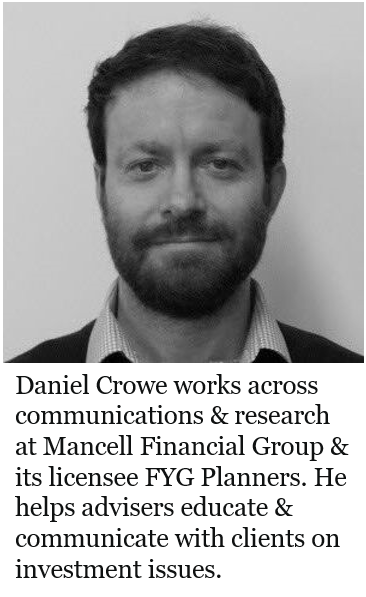
There’s no need to run a poll. Trust in the medical profession is at an all time high. Doctors and nurses are treating the sick. Dealing with things up close we can’t imagine. They’re risking their lives doing so. Our local hospital has been the epicenter of an outbreak. In contrast, your average financial adviser is cooped up at home. Their day plays out in a spare bedroom. Teams, Zoom and phone calls are the closest contact they’re having with society. It’s safe.
Admittedly, my finger is on the scale for the medics. However, financial advisers are operating under challenging circumstances right now. The challenges are still weighted more heavily towards the medical profession. But why is it challenging for advisers?
A situation like this is when they earn their money. Stopping mistakes being made. Advisers put a stack of work into educating investors. Upfront explaining what is possible and what isn’t possible. Reinforcing it along the way. The knowns and the unknowns. Most knowns are accounted for. The unknowns is pretty much one thing – what the market does. Every year your local equity market index will likely lose 12-15% at some point. Like clock work. Doesn’t mean you won’t make 7% for the year, but you’re like to have three months where you take it in the teeth.
Investors become conditioned. When they accept the reality of market movements, it’s easier on them. The adviser’s phone doesn’t ring when the market drops 10%. There’s no need to talk an investor off the ledge. It’s now part of life. There are other things to focus on. Job. Family. Entertainment. Exercise. Life.
COVID-19 just sideswiped life. It’s the only media story. It has become life. There’s little else to focus on. I’ve heard very little in the way of investor panic from advised clients. This is across several states and countries. It doesn’t mean investors don’t want to talk. Why? I could say Netflix and books only tide a person over for so long, but this is not the normal 12-15% down. And this is not a normal situation. In a relationship business, it’s absurd to think investors aren’t going to want to speak during an historic event. Most end the call comforted.
Who might not be comforted? Imagine a profession at the forefront of dealing with the virus.
If you heard a doctor was liquidating their investment portfolio in response to COVID-19, what would you think? A doctor getting out of the markets because of COVID-19. That’s a bad sign, right? Worth reconsidering your own portfolio? If you took that information to your adviser, it’s a pretty legitimate case to jump. Doctors know medicine. They’ve never seen anything like this. They expect it to become much worse.
Imagine a doctor making that case to their adviser. Who is the real authority on the direction of the economy and investment markets in the midst of a global pandemic? Surely the adviser has to acquiesce to the Doctor’s superior knowledge on all things medical and health?
No.
The adviser is the one with the clear head. They’re neutral on the direction of the economy and investment markets. They understand there will be economic pain in the short term, but stimulus is coming. They can see there have been investment market falls, but they also know expected returns increase after market falls. They’re not forecasting market direction. They’re working to goals and a plan.
The doctor has unquestionable knowledge of health and medicine. In this scenario they’ve mistakenly applied it to the completely unpredictable world of investment markets. They now have an expectation of economic and investment ruin because of what they’re seeing or experiencing. Their lens of medical knowledge is unhelpful. It’s downright distorting when applied to an investment decision.
A doctor’s knowledge of a pandemic’s impact on a human being, priceless.
A doctor’s knowledge of a pandemic’s impact on an investment portfolio, negligible.
This isn’t profession specific. Right now, social media is awash with infuriated people. Financial and investment people. They don’t like the stimulus. They don’t like the central bank intervention. The market recovery is not what they expected. Maybe it’s genuine concern. Maybe it’s been costly for them. They took an opposite position. In every case there was an opinion and it didn’t work out. I may have an opinion on the virus, the stimulus and the central bank intervention. My opinions are irrelevant. You can bet your adviser won’t be managing your portfolio using their opinion.
The lens required to make investment decisions will never be a lens of narrow expertise. It will be a lens of broad clarity. A lens that helps us see clearly. We need to be wary of letting our profession or beliefs have any influence on our investment decisions.
For investors, it’s not a medical problem, but a behavioural problem. It’s always been a behavioural problem.
I recently talked to an adviser with a client who is a psychologist.
The psychologist is more than happy to ride this out.
This represents general information only. Before making any financial or investment decisions, I suggest you consult a financial planner to take into account your personal investment objectives, financial situation and individual needs. Don’t make financial or investment decisions on the basis of blog post or sourcing advice from internet forums, if you’d like a introduction to investing, please consider reading Your Investment Philosophy, which offers an evidence based primer for building your own investment philosophy.


